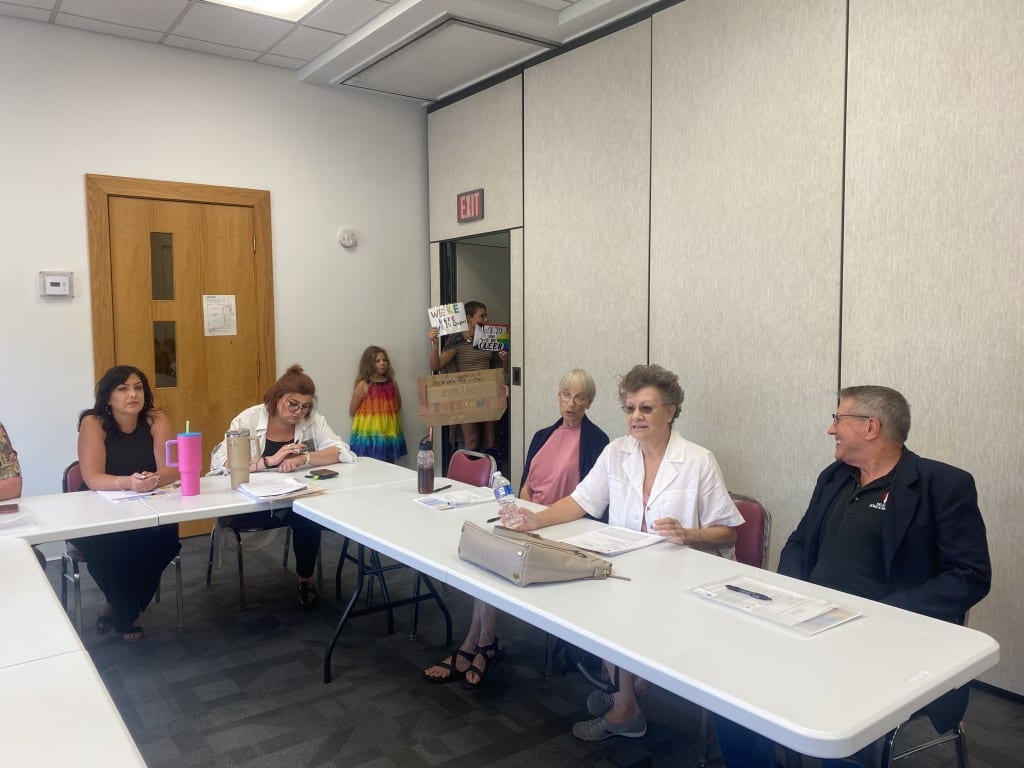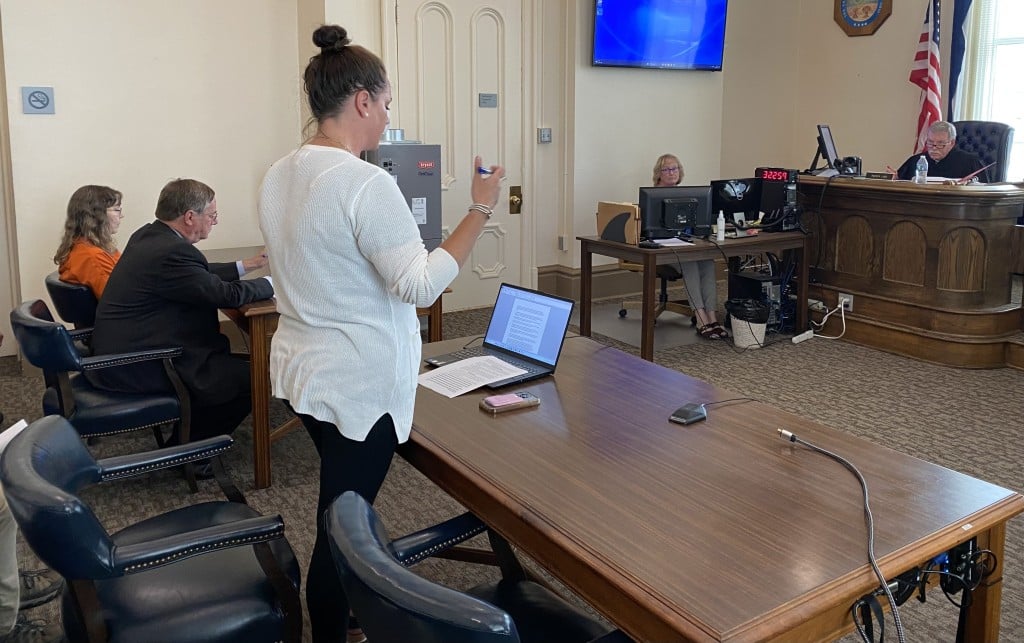Ohio moves to restrict trangender healthcare, sports participation

COLUMBUS, Ohio — Sweeping restrictions on rights for transgender people may be coming to Ohio, with impacts that will be felt in Athens County and across the state.
On Wednesday, the Ohio House of Representatives voted to override Gov. Mike DeWine’s veto of House Bill 68, which would ban transgender healthcare for Ohio youth and bar trans girls and women from participating in school sports.
The override vote will now move to the Ohio Senate, which, like the Ohio House, would have to override the governor’s veto with a three-fifths majority vote for the bill to become law. The bill would go into effect 90 days after the senate’s vote. The senate is to vote on Jan. 24.
Additionally, DeWine signed an executive order last week banning gender affirming surgeries for minors in Ohio. Such surgeries were already not performed in the state, according to healthcare providers.
The same day, DeWine announced draft administrative rules that would broadly restrict healthcare for transgender people of all ages by setting up many more hurdles for both patients and providers.
The administration is taking public comments on DeWine’s proposals — to collect data “addressing gender-related conditions and treatment” and provide it to the General Assembly every six months, and to restrict gender affirming healthcare for people of all ages — via ODHrules@odh.ohio.gov until Feb. 5.
The Ohio Department of Mental Health & Addiction Services is also taking public comment on a proposed rule and a proposed amendment from DeWine, both of which govern “procedures for gender transition care in private psychiatric hospitals as well as community behavioral health settings.” Comments may be sent via email at MH-SOT-rules@mha.ohio.gov, with the subject line “Comments on Gender Transition Care Rules,” no later than 5 p.m. next Friday, Jan. 19.
If the rules go into effect, Ohio will have among the most restrictive regulations on transgender healthcare for adults in the country.
The combined effect of the anti-trans policy moving through state government “is going to make it very difficult to be a transgender person” in Ohio, said Kathryn Poe, a nonbinary health researcher with the progressive nonprofit Policy Matters Ohio.
Jessie Hill, a legal expert with Case Western Reserve University, said both HB 68 and DeWine’s draft administrative rules invite litigation. Such litigation could stall or ultimately block portions of HB 68 and DeWine’s administrative rules from taking effect.
However, Hill described the Sixth Circuit Court of Appeals, which oversees Ohio, as “hostile to trans people.”
Multiple gender-affirming care providers, including Planned Parenthood and Equitas Health, have said they will continue to offer gender-affirming care as normal, unless and until the law requires they make adjustments.
Ban on gender-affirming care for youth
If it clears the three-fifths override hurdle in the Ohio Senate, HB 68 would, in part, prohibit transgender minors in Ohio from accessing gender-affirming care, including hormone replacement therapy and puberty-blocking drugs. The bill allows minors already prescribed hormonal treatment or puberty-blockers in Ohio to continue accessing care.
The bill directly contradicts the advice of every major medical organization and health authority. Transgender and gender nonconforming youth experience suicidal ideation at much higher rates than cisgender peers. Gender-affirming care greatly improves mental health and wellbeing for transgender and gender nonconforming children and adolescents.
Among the bill’s 47 sponsors in the Ohio House of Representative are Jay Edwards (R-Nelsonville) and Don Jones (R-Freeport). Edwards and Jones both represent Athens County, after state redistricting split Athens between their respective districts, 94 and 95.
Edwards told the Independent in a written statement that “minors should be protected from life altering hormones” and “have no capacity to be diagnosing themselves.”
“There is no way a child should be in control of the life altering medicine being put into their bodies,” Edwards said.
Children in Ohio receive gender-affirming medical treatment only when prescribed by a physician, according to Planned Parenthood.
Jones did not respond to multiple requests for comment directed to his office. Office staff for Brian Chavez (R-Marietta), who newly represents Athens County as a state senator for district 30, told the Independent Chavez was unavailable for comment.
Ari Faber, a trans person and Athens resident who will run as a Democrat against Chavez for Ohio Senate District 30, said HB 68 “has me thinking about what my life was like as a young, trans, queer person living in an incredibly conservative, Pentecostal home and then at an independent fundamental baptist college for two years.”
“Gender-affirming care literally saved my life and I am devastated for the children, teens, and young adults who will no longer have access to this care,” Faber said. “I am heartbroken for them and hate to think of anyone feeling the way I did for so many years. These kids and their families deserve better.”
“It’s exhausting, especially when we just want to be able to live our lives in peace and for trans youth to be able to grow into adults. … The [lack] of compassion and empathy is astounding and a slap in the face to trans people across the state,” Faber said.
Wenda Sheard, who will run as a Democrat this year for Ohio House District 94, said, “We need a legislature willing to focus on issues affecting everyday Ohioans rather than a legislature pretending they know more than medical professionals.” Sheard said the vote reflects a gerrymandered legislature and called for “citizens, not politicians to draw district maps, so voters can choose their legislators instead of legislators choosing their voters.”
Athens City School District Supt. Tom Gibbs shared his opposition to the bill in a statement concerning the bill’s impact on the district’s students.
“In my opinion, families should not be hindered in their ability to make medical decisions for their own children in collaboration with guidance and input from medical professionals,” Gibbs said.
Rhea Debussy, director of external affairs at Equitas Health, which operates in Athens and across the state, and Rock Riffle Wellness Co-Owner Mosha Trout, a local licensed professional counselor who works with queer youths, said they and their colleagues have been alarmed by the language proposed by the General Assembly and DeWine administration.
Both noted that the proposed changes will disproportionately affect children who are poor or live in rural areas.
“A lot of clients that I work with are probably more privileged than other folks, and they will be able to leave the state to receive services elsewhere,” Trout said. She added that she has seen firsthand from clients and colleagues the fear and anxiety HB 68 and the proposed rules have inspired.
“How do you not take it personally, in this way of feeling like there’s something so wrong with me that [the government] is getting involved — when this should be such a private matter between the client, the family and the care team,” Trout said. “There’s a lot of families right now that are like, ‘Do we just move?’”
Trout voiced concern over anti-trans legislation “giving permission to discriminate” and “trickling down” from the governor’s office to schools.
School sports ban
HB 68 forbids transgender children from participating in sports with children with whom they share the same gender identity; it separates children’s sports by “sex,” with the exception of co-ed teams. The law also forbids complaints “against a school or school district for maintaining
separate single-sex interscholastic athletic teams or sports.”
Edwards said the ban is necessary because, “I believe girls should be protected” from transgender girls, whom Edwards referred to as ‘boys,’ “competing against them in sports.”
Gibbs said in an email that the district “has long respected the right of individual students and their families to make decisions about gender identification and we have made adjustments as per the requests from the student and/or parents.”
Transgender students have participated on school athletic teams in Athens City Schools “and there have been no complaints or issues of which I am aware,” Gibbs said.
Pediatric exercise physiologist Emily Hill Guseman, an OU faculty member, said in a written statement that allowing trans students to participate in sports benefits everyone involved.
“Children and adolescents benefit from the sense of belonging that comes with membership on an inclusive team,” Hill Guseman said. “With high levels of depression and suicide in gender non-confirming youth, this sense of belonging is absolutely critical.”
Hill Guseman said youth sports benefit children primarily by providing education in “team work, perseverance, self-control, self-confidence, and a love for moving their bodies that can carry them into healthy adulthood. For all of these reasons, excluding trans girls and women from sport[s] is damaging for everyone involved.”
Gibbs said this exclusion “serves only to further marginalize a very small portion of our population.”
He added that, in his opinion, requirements regarding school athletics appear to contradict Title IX guidance. Other Athens County superintendents did not respond to a request for comment.
Case Western legal expert Hill, who specializes in Title IX law, said she expects legal challenges to requirements on school athletics based on Title IX, which prohibits sex-based discrimination by schools that receive federal funding. However, Hill said it is currently unclear if Title IX would offer legal protections for transgender students in the context of school sports.
Rules proposed under Title IX by the Biden administration’s U.S. Department of Education could offer legal clarity, Hill said, essentially invalidating the athletics portion of HB68 under Title IX rules. Those rules would prevent outright bans on transgender people participating in athletics, but would still allow individual schools to prohibit participation by transgender athletes.
However, those rules have been in development since early last year and Hill said the outcome is “very much up in the air.”
Both Ohio University and Hocking College declined to comment on HB68’s impact on university and college athletics prior to the bill becoming law.
A “de facto ban” on all trans care?
The administrative rules DeWine proposed last week to restrict transgender healthcare for people of all ages would:
- Require healthcare providers to report data regarding gender-affirming care for transgender people to the Ohio Department of Health, and require the data to then be shared in aggregate with the state legislature.
- Require hospitals that provide gender-affirming healthcare to engage a board-certified psychiatrist and endocrinologist in the patient’s care.
- Require hospitals to create a “written, comprehensive, multi-disciplinary care plan” for patients receiving gender-affirming care, which is reviewed by a medical ethicist.
- Require that patients younger than 21 years old receive “comprehensive mental health evaluation at the hospital seeking to provide treatment” over a period of at least six months.
Restrictions on transgender healthcare for adults are unusual in the United States, with proposed laws regulating such care having failed in multiple states. With these administrative rules, Ohio would join Florida in restricting transgender healthcare for adults.
DeWine’s proposed regulations are so extensive that, according to the American Civil Liberties Union, they could constitute a “de facto ban” on any and all gender affirming healthcare for all transgender Ohioans.
“They’re really trying to ramp this up to create fear that people won’t be willing to actually help,” Trout said. “It’s using a position of power and control over my licensure and what is actually best practice.”
At minimum, the regulations would likely require that hospitals restructure to continue providing gender-affirming treatments such as hormone replacement therapy, said Poe, the health researcher with Policy Matters Ohio.
However, such restructuring — as well as the number of providers and/or contractual relationships that would be required to provide gender-affirming care under the administrative rules — would pose a financial burden for health systems, Poe said.
The requirements could potentially prevent smaller providers in rural and suburban areas from offering care at all, given the multiple providers required to be involved in patient care, Poe said.
Equitas Health’s Debussy described the policies as an attempt by DeWine’s administration to establish “de facto ban.” However, Debussy expressed confidence that Equitas will be able to continue offering gender-affirming care should the administrative rules go into effect.
“We will jump through whatever administrative hurdles we need to jump through to continue providing gender-affirming care to our patients and to avoid any disruptions in care,” Debussy said. “We are fully prepared to fight these administrative rules at every step of the way.”
Equitas does not offer gender-affirming care at its Athens location but offers such care at other locations throughout the state. The provider is in the process of expanding its operations in the Athens area.
Planned Parenthood of Greater Ohio currently offers hormone replacement therapy for transgender patients at its Athens location.
Erica Wilson-Domer, the organization’s CEO, said in a statement, “These proposed rules are not based in science, and they go against recommendations from expert medical providers. Gender-affirming care is lifesaving care, full stop.”
Wilson-Domer added, “It is vital that those seeking care understand that these proposed rules have not taken effect and there is no change in the way our patients receive gender-affirming care at this time. We are proud to provide high-quality gender-affirming care to adults in our communities, and we will continue to do so in accordance with Ohio law.
“Our doors are open, and if you are seeking this care, we are here for you – no matter what.”
PPGO did not respond to a request for comment by press time seeking clarity on whether locations would be able to continue prescribing under the proposed administrative rules.
Poe, who is currently completing a bioethics graduate degree, said including a medical ethicist in health decisions regarding gender-affirming healthcare is particularly unusual. Most major medical systems in the state employ at least one medical ethicist, but they are generally concerned with issues such as healthcare decisions relating to end-of-life and cultural practices, Poe said. In the case of gender-affirming healthcare, Poe said there is no ethical issue, because doctors and patients agree about the course of treatment.
Debussy said she finds DeWine’s proposal that deidentified data be collected from people experiencing “gender-related conditions” alarming.
“This is a clear attempt to create a chilling effect that will reduce access to care in the state and ultimately, patients — whether or not they’re trans, nonbinary, gender expansive or intersex — have a right to determine who has access to their medical records, and suggesting that the Ohio General Assembly should have access to that data is highly unethical.”
DeWine’s press secretary, Dan Tierney, said in an email that “Data collection by the Ohio Department of Health is very commonplace. It is aggregate and does not identify individual patients. It has not had chilling effects in any other area of medicine where it is used.”
Tierney said the administration is concerned that “there is very little public data regarding diagnosis and treatment of gender dysphoria. For example, many proponents claim surgeries on minors have occurred in Ohio, while opponents claim no data shows that.”
The data collection will “allow the public and policymakers to make informed decisions with actual data regarding the frequency of diagnoses and treatments for these medical conditions, just as is done with other medical conditions,” Tierney stated.
Both Poe and Hill questioned the legal standing of the administrative orders.
Poe believes the draft administrative rules are not “implementable as is” because there is “so much vagueness and ambiguity” in the language.
Hill, meanwhile, said it is unclear where DeWine derives the statutory authority to establish the rules, which could prompt legal challenges to the rules.
“The governor doesn’t just get to make a law and neither do agencies — they have to have a statute that they are implementing — and I don’t think that they have that authority,” Hill said.
When asked which statute gives the governor power to establish such comprehensive restrictions on transgender healthcare, the ODH said “Ohio Revised Code sections 3701.13, 3701.23, 3722.06, and 3702.30 gives the Ohio Department of Health the authority to create these administrative rules.”
Following the public comment period on the rules, which ends Feb. 5, the rules would need to be approved by Ohio’s Joint Committee on Agency Rule Review.
Regardless of how the legal process shakes out, the proposed rules have already had a negative impact on transgender people in Ohio, said Poe.
“The cruelty and the trauma of having rights go away via executive orders and regulatory rules — the point is to traumatize this community,” Poe said.
Micah McCarey, director of Ohio University’s LGBT Center, said the various anti-trans legislation moving through the state government has been “an ongoing source of stress” for LGBTQ OU student “since at least last spring” — impacting students’ sense of hope, and creating personal fears about access to healthcare for students and their loved ones.
Trout affirmed that trans healthcare will continue — maybe at the risk of punishment by the state, or at the risk of safety, much like the history of abortion in the United States.
“[It] will continue to continue even if there are laws against it,” Trout said. “It just makes it more riskier, and limits access.”
McCarey said, “The LGBTQ community … in the United States has been fighting these kinds of battles — for rights to autonomy and to wellness — for decades. We have to maintain our sense of pride and progress.”
Correction: A previous article misstated Guseman Hill’s profession. It has been updated with the most correct information.
The post Ohio moves to restrict trangender healthcare, sports participation appeared first on Athens County Independent.















